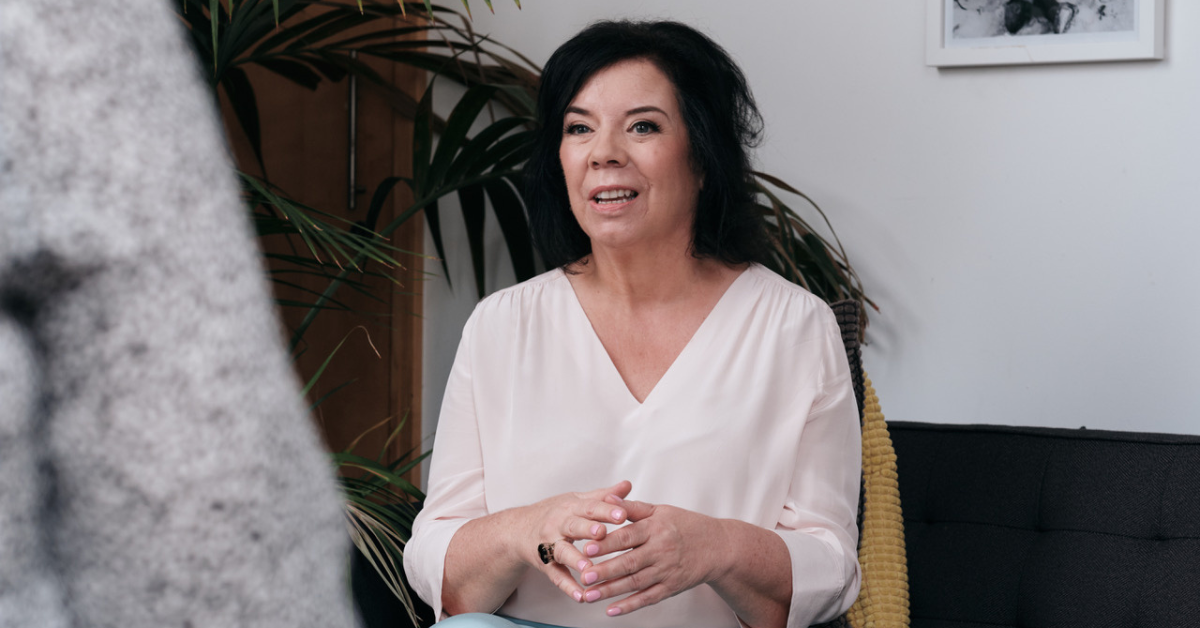In the following Q&A with Tribune Woman, Maggie breaks down the reason why so many people look for fulfillment outside of their marriages/relationships and what the road to recovery can look like for those who choose to reconcile with their partners.
As a sex therapist and relationship specialist Maggie Bain has always been a proponent of couples finding practical solutions to their relationship woes and hitting various pinnacles in their sex life.
What often trips couples up in their quest to achieve more satisfaction is their inability to get “truthfully naked”, she said. She likened it to turning on the faucet to deeper intimacy.
Maggie, who is the country’s only certified sex therapist, is back in the Bahamas and making her services available through the Family Medicine Center on Blake Road.
Maggie approaches sensitive conversations with a disarming combination of light-hearted humor and the intensity of someone who is unwilling to allow relationships to remain anything less than extraordinary. Her thought-provoking insights often leave people uplifted, hopeful and equipped to transform their personal lives. Maggie even got television show host Dr Phil to open up about his love life in 2018 when she interviewed him on the state of an international event called Mega Success.
We picked the therapist’s brain on the issue that plagues countless marriages and relationships in the Bahamas: infidelity.
She said this is an issue that hinders people from being truly fulfilled and satisfied in their relationship.

Q: Why is infidelity so commonplace in relationships/marriages?
A: “For some people their relationships run smoothly, but for others it seems difficult and hard work. Things that come naturally to some don’t come easily to others. Our personality and temperament play a large part in this, but also what we have seen and learned about love relationships in our childhood and culture. All these factors come into play and this is why knowing how to solve problems for even the smallest thing can seem insurmountable for some people. There are many reasons why people cheat and for some there is not just one. The lines get blurred and it is not unusual to hear when counselling that they do not actually remember why it happened. A reminder to all that we are talking about human failings.
Q: From your experience of counselling couples, what reason do they give for stepping outside of their relationships?
A: “Here are six reason why men and women cheat. For some there may be several reasons:
- Lost love- They describe a lack of love in the relationship and a greater feeling of love for the other person.
- Boredom feeling- Bored and needing something new and exciting.
- Neglected- Lack of attention, unexpected not premeditated but influenced by alcohol or an unexpected situation.
- Needing boost/revenge to punish their partner.
- Feeling lack of love and or/relationship satisfaction can make someone feel less committed.
- High sex drive- a lack of frequent sex, or style of sexual behaviour that drives their desire to find satisfaction outside the relationship.”
Q: Are cheaters usually remorseful about their transgressions?
A: The people who come to me are usually remorseful. They want to try to save their relationship, however, it is the depth of their ability to convey this to their partner that hugely contributes to the couple moving forward together. Over the years I have witnessed the straightforward “I’m sorry” to the wailing “I can’t live without you. Please, please forgive me.” The level of the honesty and sincerity, plus the commitment to work through these feelings will test their words and promises.”
Q: Who cheats more, men or women?
A: “As expected, there is a lack of Bahamian statistics on infidelity, and this is a study I am considering commencing in the near future. Therefore, we shall refer to US results. According to the General Social Survey (GSS) 20 percent of men and 13 percent of women reported having sex with someone other than their spouse while married. Interestingly, Institute for Family Studies (IFS) 2020 reported the gender age gaps – 18-34 and 65+ of both men and women have the same infidelity rate of 16%.
Q: Do couples ever really recover after infidelity?
A: When a couple comes to me for guidance during a time of crisis such as this, they need to recognise that a wound has been created. It can heal, but the relationship will never be the same again. The pain can heal, but there will always be a tender spot which can be easily reopened if not taken care of. Their ability to focus on the recovery work and how to move forward, hopefully as a couple, is what makes the difference. Like so many things in life there are no guarantees, and we are reminded that people stay in our lives out of choice. This means that each person holds a personal responsibility to create a safe and attractive place for the other to stay. The focus will then be looking inwards to each other instead of outward to the distractions; something many couples have never learned how to do.”
Q: Under what circumstances should a person reconcile with a partner who has been unfaithful?
A: “My role is not to tell people what they should do or not do, because tue change cannot take place unless it comes from an authentic place. My goal is for you to be able to self-reflect and self-realise what you want from your life and for you to make the changes yourself. My belief is that a committed relationship, and particularly if there are children involved, deserves a conscious effort to succeed. Some people have clear beliefs and values about what they would do should they ever be faced with such a difficult situation. For them it is clean cut and they move on quickly. However, speed is not always the solution as sweeping it all neatly under the carpet may have a way of reappearing in future relationships. Fear can make us run or it can immobilize us, and for those who find themselves tormented with the, ‘Should I stay, or should i go?’ They need to come for urgent assistance. Living in a place of pain is not good for your mind, body or soul. It can cause an enormous amount of stress and anger, which can have a catastrophic effect, the worse being domestic violence. This is why compassion and guiding people early to get professional help is essential.
Q: How difficult is it to rebound after infidelity?
A: “Doing this work, I have been reminded of the saying ‘Never say never’. I have seen amazing recoveries and living transformed by committing to their personal healing. It is a testament to the strength of an individual’s spirit when confronted with a deep challenge, which often results in the ability to become more resilient to life’s ups and downs. Alternatively, I hae seen the stunning effect that has self-limited beliefs have over people. Nothing changes for them and they remain stuck in their pain because they believe they are not able to heal. THis is why investing in yourself and taking the time to learn new coping skills will allow you to recreate yourself, and turn your pain to your advantage. My work constantly reminds me that nothing is wasted in our life and we can learn from each experience, if we choose.”

Q: What steps would they have to take to fully recover as a couple?
A: “Without a doubt it is essential to start couples work as soon as possible after such a devastating event and to be committed to the process of recovery. Sometimes the one who has been hurt feels that their partner is the only one who needs to do the work, but this is not so. No matter the reason for the infidelity, it has caused damage to the partnership and ultimately the love. Both persons need to be heard, to listen and to express their emotions, which usually they have not been able to do by themselves. This is where my presence and guidance can open up difficult conversations and provide expert advice in conflict resolution. Understandably, this work is emotionally exhausting and because of the unpredictability of the situation I am also able by email for additional support. For some, it can be unsettling to learn that there is no set timeline for healing, or if in fact they will ever be able to meet their partner’s trust needs. This uncertainty can deter even the strongest until they realize that their own personal growth will benefit in learning how to live and love more fully. Once the worst is over and couples have turned the corner, I often hear the same words being spoke, “If only we had come sooner’.”
By Jeffarah Gibson Tribune Features Writer

Relationship & Intimacy Counseling with Maggie Bain
Initial Consultation: 10 Minutes
Call to book: 702-9310 ext: 130 or use our appointment request form

